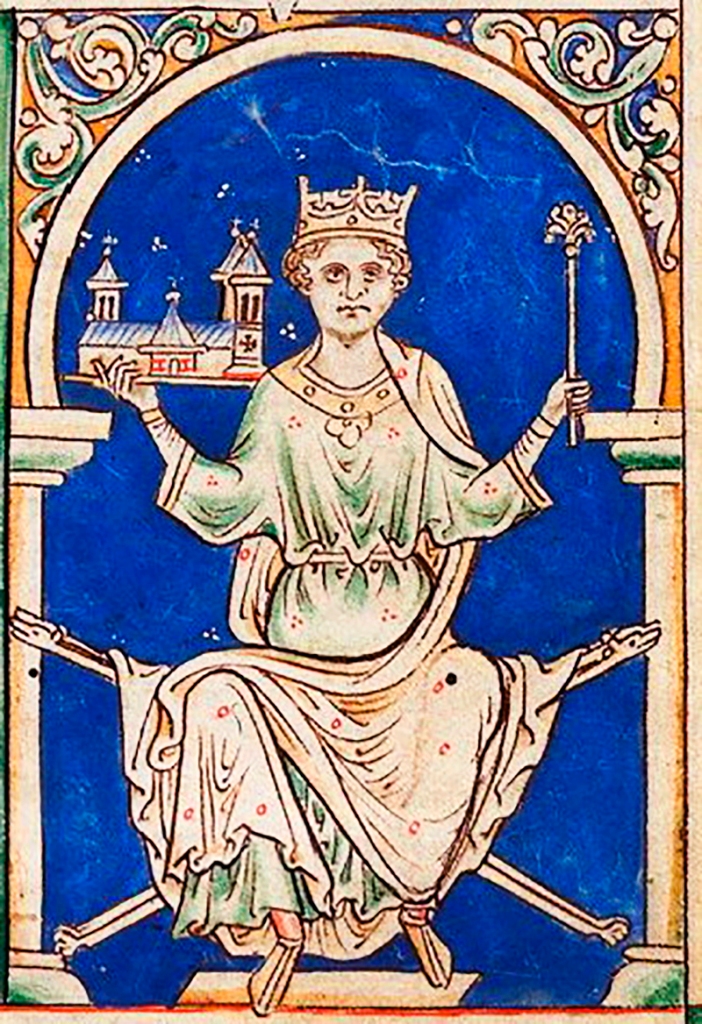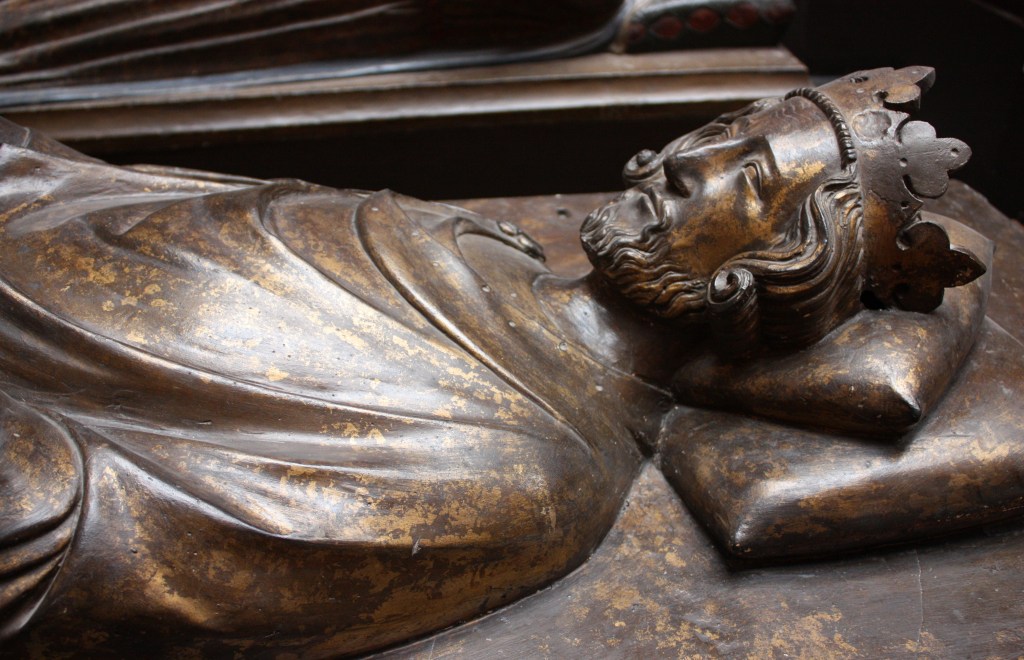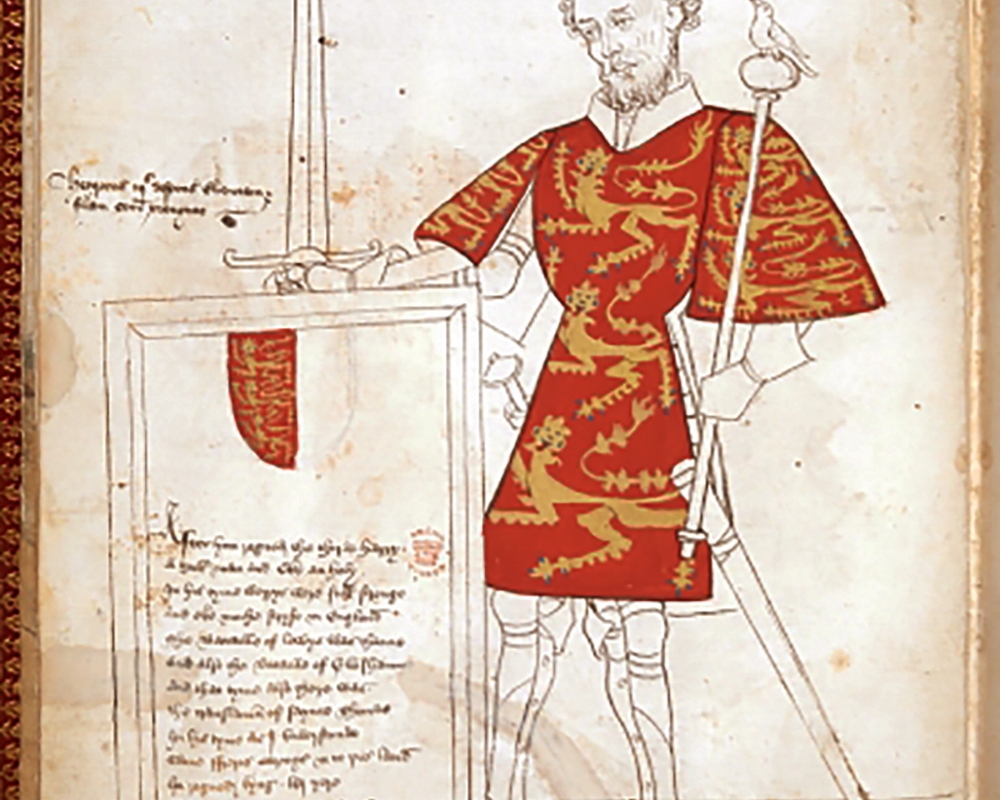Embarking on a biography of Henry III was an exciting but daunting task. He is a king many might struggle to place in English history. Men like William Marshal and Simon de Montfort have made more of a mark on the history of Henry’s reign than the man himself. Sandwiched in an almost non-descript period between the disasters of John and the towering figure of Edward I, there were nevertheless immediate pointers that there might be more to this man and his period wearing the crown than is attributed to him. He remained king for 56 years, a record until George III in 1816, Queen Victoria in 1893 and more recently Elizabeth II hit that milestone. His rule saw the finest hour of one of Europe’s most famous knights, the last great Justiciar in England, a role almost forgotten today, but equivalent to a Prime Minister today and a role not to find a true parallel until Henry VIII relied so heavily on Thomas Wolsey and the Thomas Cromwell, the emergence of a body taking the name ‘parliament’, a Second Barons’ War and a man (wrongly) dubbed the father of parliamentary democracy.
As I researched this elusive man I made my notes and filed things ready to organise my thought. It wasn’t until I began to draw these disparate threads together that an intriguing but ultimately unprovable notion began to stand out from the page. Individually, the items meant little, beyond being interesting and sometimes confusing snippets, but as I began to string them together, a question began repeating itself, nagging away at the back of my mind. As much as I was unable to offer it as a proven fact or even a provable theory, I couldn’t stop it repeating away.
Was Henry III autistic?

Matthew Paris, a key recorder of this period of English history, though frequently diverted by his own monkish prejudices and agendas, met Henry during the king’s visit to St Albans Abbey at the time bones believed to belong Saint Alban himself had been found and were being reinterred. Matthew quite proudly notes that he was able to spend time in personal conversation with the king and in recalling their discussions he noted that he had been impressed by Henry’s ability to recall complete lists of things such as German electors and English saint-kings. The recall and reliance on lists of known information, called rote memory, is a well-known ability of those affected by autism. Sadly, I could not find other examples of this being recorded to corroborate it or demonstrate it being a prominent portion of his personality, but it may be telling that when placed in a social situation with a person he did not know, Henry fell back on reciting lists.
In 1258, as England began to slide towards what became the Second Barons’ War, Matthew Paris recorded an encounter between the king and his troublesome brother-in-law Simon de Montfort. The interesting portion of the story for the purposes if this discussion is that Henry was rowing down the Thames when a thunder storm erupted. The king was so terrified of the noisy storm that he ordered his barge to put in at the nearest dock. The house in which he took shelter happened to be being used by Simon at the time and Matthew placed prophetic words into the king’s mouth, having him tell his brother-in-law ‘I fear thunder and lightning greatly, but by God’s head I fear you more than all the thunder and lightning in the world.’ Nevertheless, Matthew might have struggled to write what he did if it was not the case that Henry was known to be scared by thunder and lightning. Perhaps Henry had a fear of storms unrelated to anything else. Perhaps Matthew even made up the story to allow his prophesy of trouble between the in-laws, but if sensory sensitivity is behind the episode it is another pointer to potential symptoms of autism. This might be supported by the fact that at the Battle of Evesham in 1265, although an old man, Henry was found curled into a ball shouting to be left alone, overwhelmed by the experience of being caught in the midst of the noise and chaos of the battle.
One thing that does reoccur is a trait that might point to a need to assert royal authority and keep unruly barons on their toes, but which could also contribute to increase the potential for a diagnosis of autism. When Henry’s first son, Prince Edward (later Edward I) was born in1239, gifts poured into the capital city to celebrate the momentous event. Henry made a point of asking who had sent each gift and if he didn’t think that the value reflected the wealth and position of the sender, he ordered it to be sent back and a more suitable replacement sent that met his expectations. Matthew Paris recorded that ‘the king deeply clouded his magnificence as a king’ and one joke reportedly doing the rounds in London quipped that ‘God gave us this child, but the king sells him to us’. Henry repeated this behaviour in 1254 when he returned from a rare successful venture to France. On his return to London, the city joyously gave the king a gift of £100 only to be dismayed when Henry told them flatly that it was not enough to recognise his achievements. There was much desperate scrabbling and Henry was only satisfied when a cup valued at £200 was added to the cash gift.
Henry did have a dire and deeply vested interest in establishing the authority and prestige of the crown, so these may have been displays designed to check and wrong-foot both the barons and a capital Henry always had an uneasy relationship with. However, high-functioning autism such as Asperger’s Syndrome is frequently accompanied by social awkwardness and a tendency to be honest and to say things those without autism might shy away from saying. Without understanding Henry’s true motive, it is hard to know whether this was a calculated strategy or an example of behaviour that might point further toward a degree of high-functioning autism.

The final piece of suggestive evidence that I can offer is Henry’s often unhealthy obsession with Edward the Confessor. The saint-king fascinated Henry and drove many of his choices through his life. His first son was probably given the very Anglo-Saxon (and previously unused in Norman and Angevin royal circles) name of Edward most likely in homage to Henry’s hero. When Henry rebuilt the Confessor Abbey at Westminster with his gothic masterpiece, he had the Confessor’s bones moved to a central position of high honour and had his own tomb built over the exact spot on which Saint Edward had rested for two centuries. When Henry had the Painted Chamber at Westminster Palace redecorated to use as a private bedchamber, he had a portrait of Edward the Confessor painted over his bed. It was a lifelong and deep obsession that is again a potential symptom of a high-functioning form of autism, though as with each other piece of the puzzle, far from confirmation.
Each of these pieces individually would mean nothing. Taken together, they begin to build a suggestion of a form of high-functioning autism but, with a definitive diagnosis difficult enough to confirm face to face today, trying to construct anything beyond a suggestive set of symptoms that might add to up possible autism. It is therefore impossible to state that Henry III had any degree of autism, but it is fascinating to consider what it might mean if he did. Henry ruled England for 56 years, in spite of frequent problems. He handed over a kingdom rescued from the brink of disaster and ripe for the consolidation and expansion of his son’s reign. The lack of a favourite, if due to a difficulty in forming close social connections, possibly worked in his favour. Weak kings tended to be dominated by unpopular favourites but Henry never suffered in this respect. He was at odds with Simon de Montfort as much as they were best friends. Henry tended to flip flop in his policy, one moment swearing religious oaths to support the Charters and then denying their enforceability, perhaps demonstrating that he was easily influenced and unable to discern the motives of others in social situations.
Henry was referred to by contemporary chroniclers as ‘simplex’, which has been used to suggest that he was not a clever man and perhaps suffered from mental problems. The word ‘simplex’ is also often applied to saints to demonstrate their lack of guile and unworldliness and it has been suggested that this was what chroniclers meant, but the truth perhaps lies in the subtleties in between. Henry may have frequently appeared to lack the intellectual acumen of others, though been capable of memorising lists of information. He might also have seemed to lack the guile of a politician if he was unable to make out people’s true motives when others may have seen plainly what was going on.
Henry’s reign is often overlooked within English history. I wrote this new biography because I believed there must be more to a man who lived, and retained his throne, through such a long and eventful reign. There is some tantalising, but ultimately inconclusive evidence to suggest that he achieved all of this with a high-functioning form of autism, which would shed a new light on his achievements and his failures alike. Perhaps most intriguing of all is the possibility that ‘simplex’, which is a word that has caused debate on Henry for centuries, was in fact an early diagnosis of an as yet unknown condition. What if ‘simplex’ can be directly equated to autistic?
A new biography of Henry III: Son of Magna Carta is available now from Amberley Publishing, seeking to uncover the true story of a king all too often forgotten to history.
Matt’s book Richard, Duke of York, King By Right, reveals a very different man from the one who has passed into myth amongst the stories of the Wars of the Roses
Matthew Lewis has written The Wars of the Roses (Amberley Publishing), a detailed look at the key players of the civil war that tore England apart in the fifteenth century, and Medieval Britain in 100 Facts (Amberley Publishing), which offers a tour of the middle ages by explaining facts and putting the record straight on common misconceptions.
Matt is also the author of a brief biography of Richard III, A Glimpse of King Richard III along with a brief overview of the Wars of the Roses, A Glimpse of the Wars of the Roses.
Matt has two novels available too; Loyalty, the story of King Richard III’s life, and Honour, which follows Francis, Lord Lovell in the aftermath of Bosworth.
The Richard III Podcast and the Wars of the Roses Podcast can be subscribed to via iTunes or on YouTube.
Matt can also be found on Twitter @mattlewisauthor and Facebook.

Absolutely fascinating and as a practicing psychotherapist you make some really compelling points
Makes sense. My brother and I, our father and my niece all have, or had, Aspberger’s. My brother and I descend through numerous lines from Edward III, and therefore Henry. Dad descends from Henry’s brother, Richard. I never met my paternal grandfather, but the things I’ve heard about him leads me to suspect he also had Asperger’s.
An awful lot of people are descended from Edward I. He had twenty children (though many of them died young – Edward II came 15th and had several elder brothers). Joan of Acre (no. 7) married into the nobility twice, rather than into foreign royalty, and had eight children, her sister Elizabeth’s second husband was Humphrey de Bohun and they had eleven. Edward’s younger brothers became earls of Norfolk and Kent, and thus also had issue. After 28 generations, there must be uncountable
descendants around the world.
As someone with a high-functioning autistic grandson, I think you’re right, Matt.
Great post! I am a direct descendant of King John. I started to become interested in genealogy many moons ago because I wanted to try and find out if there was any link to my ancestry and the high proportion of autism in the family. Your conclusions do not surprise me at all!
The incident of the intruder in the royal bedchamber strongly reminds me of the 1982 one involving Elizabeth II and Michael Fagan. However, the Queen was merely stalling for time until help arrived. Could Henry III have been doing the same? It has also been suggested that a similar motive may have been the reason for Elizabeth I’s surprisingly calm reaction when in September 1599 the Earl of Essex forced his way into her bedchamber before she was fully dressed, at a time when as far as she or anyone else knew he was still in Ireland. For all she knew he had arrived with his army at his back and a coup in mind; once she had a chance to assess the situation he quickly found himself under house arrest and she never saw him again.
It is entirely possible that there was some psychology at work, convincing the intruder either that Henry was just a nice guy or that you can’t just stab a king – or perhaps both.
Very interesting and very plausible from the little I know about autism. I have an ex-common-law grandson (!) who has Asperger’s and there are strains of ADHD in my own family – there are similar symptoms.
As the mum of a HF daughter I would say your argument is quite compelling… Some of the things you describe like lack of awareness of danger and what we call ‘mouth before brain syndrome’ are all too familiar
I’ve long had similar thoughts about Henry VI… and there is a genetic element to autism….
Could John have had Asperger’s? He’s getting on for two hundred years too early for me so I don’t know about him in detail, but there does seem to have been a mutual lack of understanding between him and the barons.
Hi Christine. It is possible, though as I have said in the post any attempt at diagnosis at this distance will always be flawed. We know that John was never still and was a frantic administrator who was unable to create the social relationships a king required in order to succeed. Sadly it’s hard to tell whether this might have been some form of autism or just a terrible personality.
A terrific and insightful piece. I have studied HF autism and observed Asperger’s at close range and you make a solid case. Thanks, most interesting.
Interesting thoughts about Henry III.
I watched a documentary today about Henry and was left wondering if he could have had autism. I have two sons with autism and your article (which I found after googling ‘was Henry vi autistic’ ) is convincing in my opinion.
Really interesting thoughts here. I found this book excellent and really enjoyed reading about this king who is as you say Matthew is overshadowed by his father and son.
I’m also autistic myself, and there’s some pretty compelling evidence here. I’m pretty fascinated by the possibility of King Henry VII being autistic. He also shows a lot of the traits, including collecting stuff and a deep fascination with the legend of King Arthur, to the point he named his first son Arthur! He’s also often described as quite the recluse.